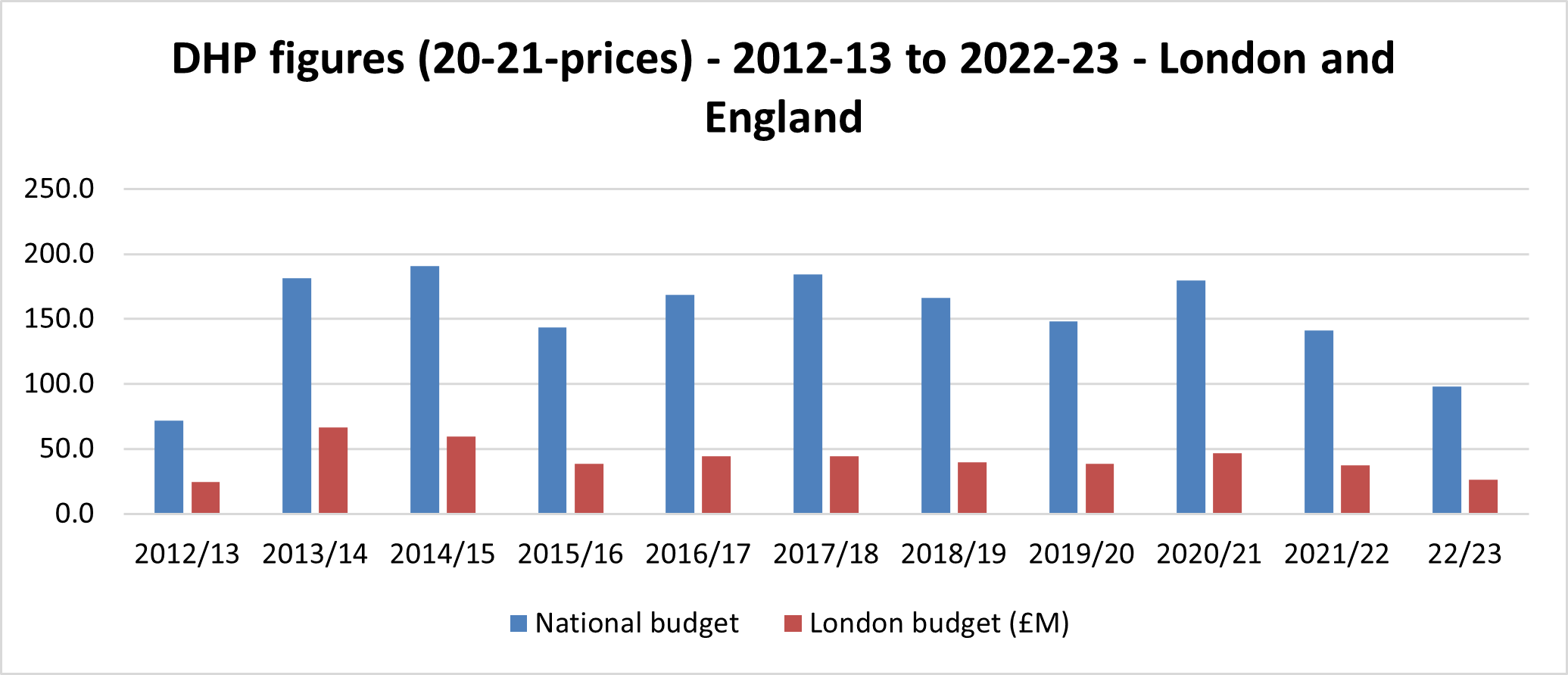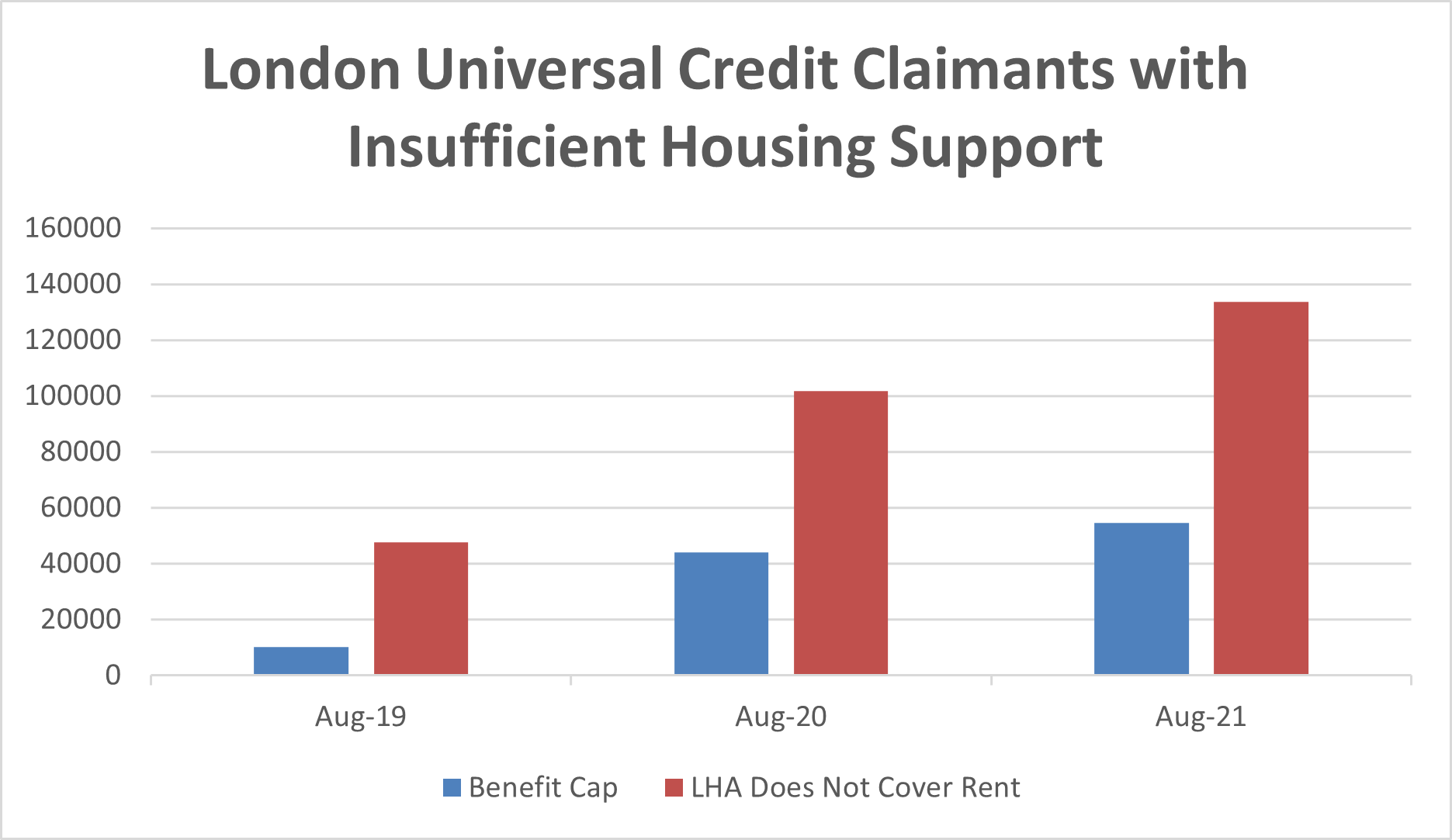Background
Discretionary Housing Payments are discretionary payments administered by local authorities that can be made to benefit claimants to provide additional support for housing costs. Where a resident is entitled to support for their housing costs, either through Universal Credit or Housing Benefit, but that support does not fully cover their rent they can apply for a Discretionary Housing Payment.
Discretionary Housing Payments existed before the start of the government programme of welfare reform but funding for them was significantly increased in order that they could be used to mitigate some of the impacts from changes to Local Housing Allowance, the Removal of the Spare Room Subsidy and the Benefit Cap.
Discretionary Housing Payments are now the main homelessness prevention tool available to boroughs and are used to meet the shortfall between a low-income household’s rent and the support they receive to cover it. Without the intervention of Discretionary Housing Payments these households would accrue rent arrears and be placed at risk of homelessness.
In 2022/23 funding for Discretionary Housing Payments has seen a 28 per cent reduction in the national budget from £140 million to £100 million, while London’s allocation has fallen from £37.2 million to £26.7 million.
Funding
Local authorities receive funding for Discretionary Housing Payments from the Department for Work and Pensions and London’s allocation has historically not been sufficient to meet demand in the capital. From 2013 to 2021 London boroughs collectively spent an additional £17.6 million on Discretionary Housing Payment on top of funding received from the government. Despite this clear need London authorities’ allocation has seen a real terms reduction of 165 per cent from 2013/14 to 2022/23, compared to a 116 per cent fall in funding nationally. At the same time London’s share of the national DHP budget has fallen from 36 per cent in 2013/14 to 27 per cent in 2022/23.
Homelessness Pressures
The most recent reduction in funding for Discretionary Housing Payments comes at a time where London is facing severe homelessness pressures. The number of homeless London households living in Temporary Accommodation is at near-record levels of 59,160 household. London has the most severe pressures in the country, accounting for two-thirds of England’s total temporary accommodation numbers (96,060 households).
Discretionary Housing Payments also have a vital role to play in helping to meet the government’s objective of ending rough sleeping, According to the CHAIN rough sleeping database in 2020-21 there were over 800 new rough sleepers (of the 4,000 for whom data was available) who told outreach workers that they had lost their accommodation because of rent arrears, debt and other financial problems. In these instances, a Discretionary Housing Payment could of helped to keep these individuals in their accommodation.
At the same time the main demand drivers for Discretionary Housing Payments have continued to increase in London. Since the start of the pandemic London has seen a large growth in the number of households affected by the Benefit Cap, which limits the total amount of benefit a household can receive to £23,000 a year for couples or lone parents and £15,410 for single adults. The number of Universal Credit claimants affected by the Benefit Cap saw a 436 per cent increase from 10,192 in August 2019 to 54,640 in August 2021.
Overall the number of Universal Credit claimants resident in the private sector for whom the support they receive is not sufficient to pay their rent has increase by 180 per cent, from 47,538 in August 2019 to 133,570 in August 2021, placing them at risk of financial hardship and potential homelessness.
On top of this the cost of living crisis will undoubtedly further intensify homelessness pressures Evidence indicates that 34 per cent of Londoners have struggled to pay their household bills in the last six months and nearly 80% of Londoners have experienced increases in their cost of living over the last six months. The package of measures recently announced by the Chancellor, including the £150 Council Tax Rebate, will provide some financial relief to these household. However, London boroughs know from their experience in supporting household threatened with homelessness that such financial pressures inevitably lead to difficulties in meeting housing costs and Discretionary Housing Payments are an essential tool to prevent homelessness in such cases.
Commentary
In a recent speech announcing the Delivering Together to End Rough Sleeping strategy the Secretary of State for Levelling Up, Housing, Communities and Local Government, Michael Gove, said that we need to pull all the levers available to government to deal with factors like debt that generate homelessness and that the government needs to do everything that they can to keep people in accommodation they can afford. Discretionary Housing Payments remain the best tool available to local authorities for supporting households to remain in their accommodation and Discretionary Housing Payments are an essential tool to prevent homelessness in such cases.
Given the rising pressure of the cost of living, boroughs anticipate an increase in the number of London residents unable to meet their housing costs, yet reduced Discretionary Housing Payment funding means boroughs will be able to support fewer households. While other means of support provided by the government will be vital in supporting households through the cost of living crisis Discretionary Housing Payments remain the only tool available to provide additional help with housing costs and it is essential that funding is sufficient to meet demand.


